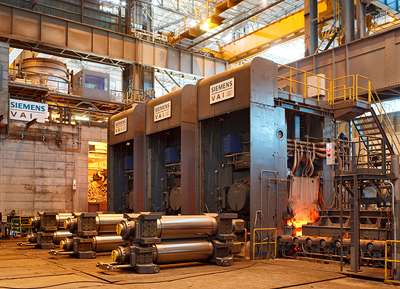Producing steel strips in an endless process

An especially energy-efficient production process for sheet steel is now being used in China. Siemens is providing a Chinese steel manufacturer with two plants that work according to the Arvedi-ESP (Endless Strip Production) process. They produce high-quality ultrathin hot-rolled strips with widths of up to 1.6 meters and minimal thicknesses as small as 0.8 millimeters. The Arvedi-ESP process requires up to 45 percent less energy than the conventional process, which consists of separate casting and rolling steps. It therefore generates significantly smaller amounts of CO2.
The production of steel strips normally requires a great deal of energy and space. Liquid steel is cast in slabs; these are steel plates that are a few centimeters thick, about one to two meters wide, and more than ten meters long. These slab ingots cool off and are processed in the rolling mill into steel strips that in some cases are less than one millimeter thick. Before this can happen, the slabs must be newly loaded and heated up once again. Finally, the steel strips are rolled onto large reels called coils. In total, such a production line is several hundred meters long. The steel strips are processed for use in automobiles, household appliances or construction materials, for example.
The special feature of the Arvedi-ESP process is that the casting and rolling processes are performed in a single step. The hot strand of metal is directly rolled in an endless process without having to cut slab ingots beforehand. The steel is processed into a strip in a single run and rolled into coils weighing up to 32 tons each. The entire production line is only 190 meters long. The loading and reheating of the cold slab ingots is no longer necessary, and this saves a great deal of time and energy. The process, which requires only seven minutes to transform liquid steel into a finished coil, is much shorter than conventional processes, which last several hours. What's more, it does not create any scrap material, which is normally generated in the loading process. Thanks to its precise temperature management, the plant produces steel of high and homogeneous quality.
The new units have been designed to produce 5.2 million tons of steel annually. In the startup and operation phases, the steel producer will be supported by Siemens partner Acciaieria Arvedi SpA, the company that invented the process.
Provided by Siemens




















